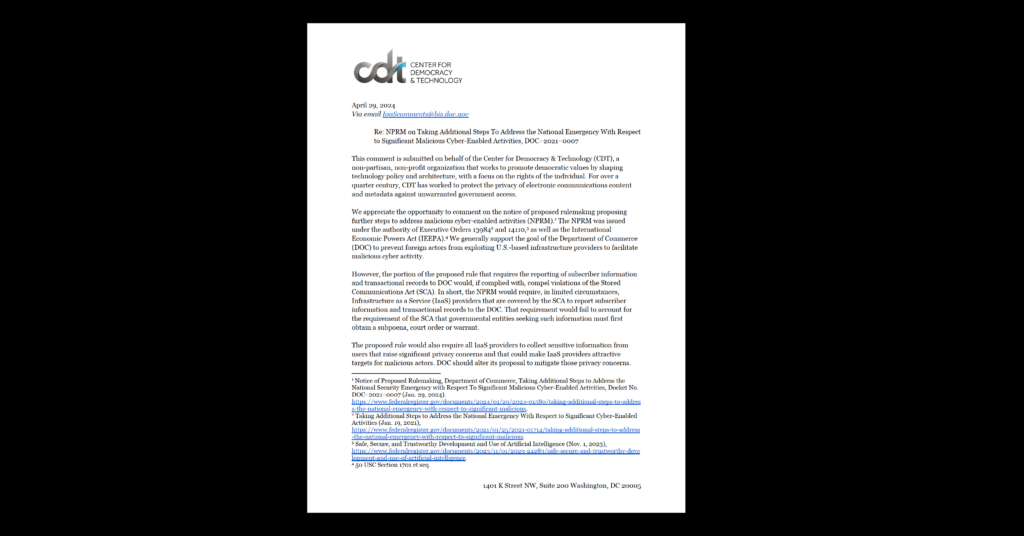Cybersecurity & Standards, Government Surveillance
UN Member States Call for US Surveillance Reforms
On Monday, US officials went before the gathered United Nations Member States in Geneva and were greeted with a message that was loud and clear: all surveillance, no matter where it takes place or whose data it involves, must comply with human rights law. As Congress and the Executive Branch continue to face urgent demands from the American public to reform surveillance, they would do well to heed this global call for change as well. In particular, the Administration should give immediate and serious consideration to countries’ recommendations to recognize that human rights apply to all surveillance; that any surveillance program must be subject to adequate judicial, congressional, and independent oversight; and that anyone whose fundamental rights are violated by surveillance activities must have access to effective redress.
NSA surveillance remains a matter of strong and detailed concern to the global community.
As CDT explained last week, the UN Human Rights Council conducted the Universal Periodic Review (“UPR”) of the United States, which occurs once every four and a half years and entails a public review of the country’s compliance with all of its obligations under human rights law. Every UN Member State had the right to participate in the US’ review, and Monday’s session demonstrated a remarkable cohesiveness among the serious issues that were raised—and showed that NSA surveillance remains a matter of strong and detailed concern to the global community.
Among the 17 countries that commented on US surveillance (or privacy rights more broadly), several emphasized something the Administration has thus far refused to acknowledge: namely, that the US must respect human rights whenever it conducts surveillance operations, including surveillance of people who are outside the United States and are not Americans. As CDT and the ACLU observed in a report to the Human Rights Council prior to the session, the Snowden documents indicate that the NSA has been intercepting the private data of hundreds of millions of people around the world every day, and the Administration’s failure to recognize that these activities give rise to human rights obligations remains a conspicuous and grave one.
In addition to this general critique, several countries specifically indicated that the US must adopt better judicial, legislative, and independent oversight of its surveillance programs. Such oversight is an essential element of the right to privacy, and is a basic safeguard that CDT has been working hard to promote both within the US and internationally. A number of countries also highlighted the fact that US surveillance places a burden on individual rights from the moment the NSA acquires private data, regardless of whether analysts later view or use it—a point that echoes a similar finding by a US Second Circuit Court of Appeals last week in a case concerning the agency’s bulk collection of records of phone calls to, from, and within the US.
Next month, the US is expected to state publicly whether it accepts these and other surveillance-related recommendations. We believe the Administration should accept the following obligations, among others, as a matter of official policy:
- Respect and protect the human rights of all people when conducting surveillance: “Ensure that all surveillance policies and measures comply with international human rights law, particularly the right to privacy, regardless of the nationality or location of those affected, including through the development of effective safeguards against abuses” (recommendation made by Brazil).
- Do the same when requiring companies to disclose users’ data: “Respect international human rights obligations regarding the right to privacy when intercepting digital communications of individuals, collecting personal data or requiring disclosure of personal data from third parties” (recommendation made by Germany).
- Conduct surveillance only on the basis of clear, comprehensive, non-discriminatory laws, and review existing laws accordingly: Review US federal laws and policies “in order to ensure that all surveillance of digital communications is consistent with its international human rights obligations and is conducted on the basis of a legal framework which is publicly accessible, clear, precise, comprehensive and non-discriminatory” (recommendation made by Liechtenstein).
- Restrict large-scale global surveillance, ensure sufficient oversight, and provide redress for violations: “Take all necessary measures to ensure an independent and effective oversight by all Government branches of the overseas surveillance operations of the National Security Agency, especially those carried out under Executive Order 12333, and guarantee access to effective judicial and other remedies for people whose right to privacy would have been violated by the surveillance activities of the United States” (recommendation made by Switzerland; similar recommendation made by Hungary).
- Take proactive measure to prevent abuses: “Take adequate and effective steps to guarantee against arbitrary and unlawful acquisition of [private] data” (recommendation made by Kenya; similar recommendation made by Costa Rica).
It is to the Administration’s credit that (as several participating countries noted) it has taken the Human Rights Council’s review of its human rights record with evident seriousness thus far. US Ambassador Keith Harper remarked before the assembled delegates that “every nation benefits from having a mirror held before it,” and the US’ decision to send a high-level delegation representing a range of federal agencies reflects the sincerity of that view. In the case of surveillance, however, there’s no escaping the fact that the mirror has revealed profound flaws. It is imperative for the Executive Branch to take action accordingly by formally declaring that it will accept and uphold the positions described above.


